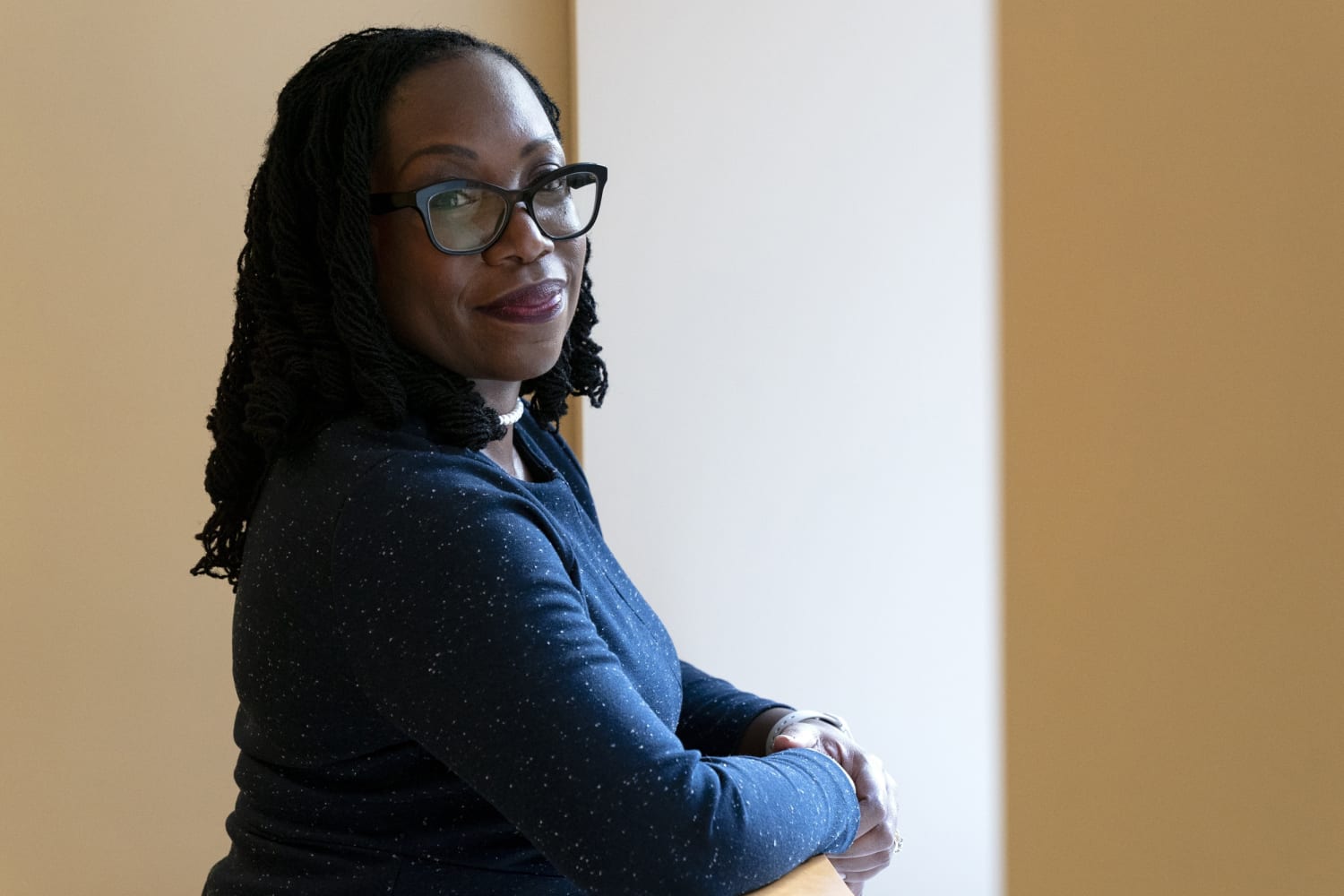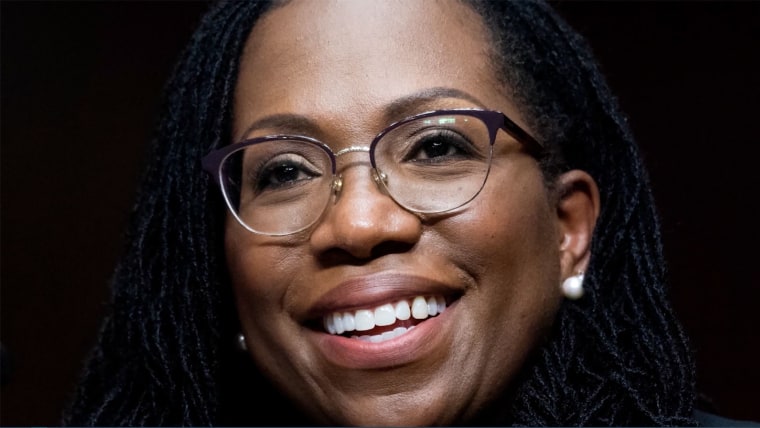In 2013, when Ketanji Brown Jackson was sworn in as a federal judge for the district court in Washington, D.C., a familiar face administered the oath of office: Supreme Court Justice Stephen Breyer, for whom she had clerked 13 years earlier.
Breyer, whose arm was in a sling after a fall from his bicycle, told attendees that he had been treated at MedStar Georgetown University Hospital, where Jackson’s husband, Patrick Jackson, is a surgeon.
“This is a judicial family affair,” Breyer joked.
Their connection is coming full circle.
President Joe Biden announced Friday that he was nominating Jackson to succeed Breyer on the Supreme Court, elevating a candidate with Ivy League credentials and a distinguished legal career that has made her a standout on several fronts and puts her on a historic path. Breyer, one of the court’s three remaining liberal justices, will retire at the end of the current term after nearly three decades of service.
Aside from becoming the high court’s first Black female justice, Jackson’s confirmation, if successful, would mean two Black justices would sit together for the first time on the bench. (Clarence Thomas is only the second Black man to serve on the Supreme Court, after Thurgood Marshall.)
Jackson would also be the first justice to have worked as a public defender. And at 51, she would be the second-youngest justice behind Amy Coney Barrett, who turned 50 in January.
The significance of Jackson’s nomination, which came exactly two years to the day after Biden promised during his presidential campaign to nominate a Black woman to the Supreme Court, was celebrated Friday by many Democratic leaders and politicians who praised her as a “brilliant and fair jurist.”
Senate Minority Leader Mitch McConnell, R-Ky., said in a statement that he looks forward to meeting with Jackson and conducting a “rigorous review” of her background. But he also hinted at the difficult track her nomination process will likely face among Republicans, acknowledging that he voted against her confirmation last year to the U.S. Circuit Court of Appeals for the District of Columbia.
Biden already signaled his confidence in Jackson when he named her to the appeals court, which is considered one of the most important federal panels and has been a regular feeder to the Supreme Court.
Three current justices — John Roberts, the chief justice; Brett Kavanaugh; and Thomas — also served on that same appellate court.
The Senate confirmed Jackson, a Harvard Law School graduate, to the D.C. Circuit by a vote of 53-44, with the support of all 50 Democratic-voting senators and three Republicans: Susan Collins of Maine, Lindsey Graham of South Carolina and Lisa Murkowski of Alaska.
Jackson fits well within the Democratic party’s and the progressive movement’s agendas. Her labor-friendly rulings as a judge have drawn praise from liberal groups. She also worked on the U.S. Sentencing Commission, the agency that develops federal sentencing policy, during the Obama administration, and voted to allow thousands of federal inmates serving time for crack-related crimes to get their long sentences reduced.
The issue hit close to home: An uncle of hers was sentenced to life in prison for cocaine possession; then-President Barack Obama commuted his sentence in 2016.
As a judge, Jackson has no record of rulings, writings or speeches on the hot-button issues of abortion, gun rights or freedom of religion. She was on the three-judge appeals court panel that rejected former President Donald Trump’s effort to block the National Archives from giving the House Jan. 6 committee hundreds of documents from his time in the White House.
In her most notable ruling as a trial judge, Jackson said former Trump White House counsel Don McGahn was required to testify before the House Judiciary Committee.
“The primary takeaway from the past 250 years of recorded American history is that presidents are not kings,” she said in a widely quoted line from her decision.
Her ruling was overturned, however, by the appeals court on procedural grounds.
In another high-profile case, Jackson sentenced the “pizzagate” conspiracy theorist to four years in prison after he shot inside a D.C.-area pizza shop in 2016.
Jackson was born in Washington and grew up in Miami. She has said her mother, a high school principal, and father, a Miami-Dade County school board attorney, chose her name after an aunt in the Peace Corps in Africa sent them a list of girls’ names and were told that Ketanji Onyika meant “lovely one.”
At Harvard, where Jackson studied government as an undergraduate, she became interested in theater and joined an improv group called On Thin Ice. She has said Matt Damon, a fellow member of the class of 1992, was once assigned to her as a partner in drama class, but acknowledged that he probably wouldn’t remember her. (A representative for the actor told The Associated Press that he did not, but he responded, “That’s so cool!”)
This month, more than 170 Black Harvard alumni submitted a letter to the White House encouraging Biden to nominate Jackson.
Nina Simmons, who organized the letter and was a roommate of Jackson’s, told The Harvard Crimson that she represents a “powerful voice” for Black students and was “never afraid to express her opinions or to argue about what she thought was right and just, so she has a very high standard of integrity.”
Jackson met her husband at Harvard, where he was a pre-med student, and they married in 1996. Three years later, Jackson would earn a one-year clerkship with Breyer, who had been nominated to the Supreme Court in 1994 by President Bill Clinton.
Jackson and her husband have two daughters, one in high school and the other in college.
After years spent working for large law firms and as a public defender in Washington, she said she took up knitting to “channel my nervous energy” when she was first nominated to a federal judgeship in 2012.
During her confirmation hearing for that position, then-House Speaker Paul Ryan of Wisconsin — who is related to Jackson by marriage — boasted to his Senate counterparts about her track record.
“Now, our politics may differ, but my praise for Ketanji’s intellect, for her character, for her integrity, it is unequivocal,” he said. “She is an amazing person, and I favorably recommend your consideration.”
In 2016, Jackson’s name was floated as a possible replacement for Justice Antonin Scalia after his death led to a vacancy on the Supreme Court.
Obama would go on to nominate Merrick Garland, but Jackson later recounted a story during a lecture at the University of Georgia Law School in which she said her youngest daughter, Leila, had drafted a letter to the president saying he should consider her mother because she “can demonstrate commitment and is loyal and never brags.”
“Patrick and I explained to her that getting to be on the Supreme Court isn’t really the kind of job that you apply for,” she told the audience. “You just have to be lucky enough to have the president find you among the thousands of people that might want to do that job.”
Source: | This article originally belongs to Nbcnews.com










